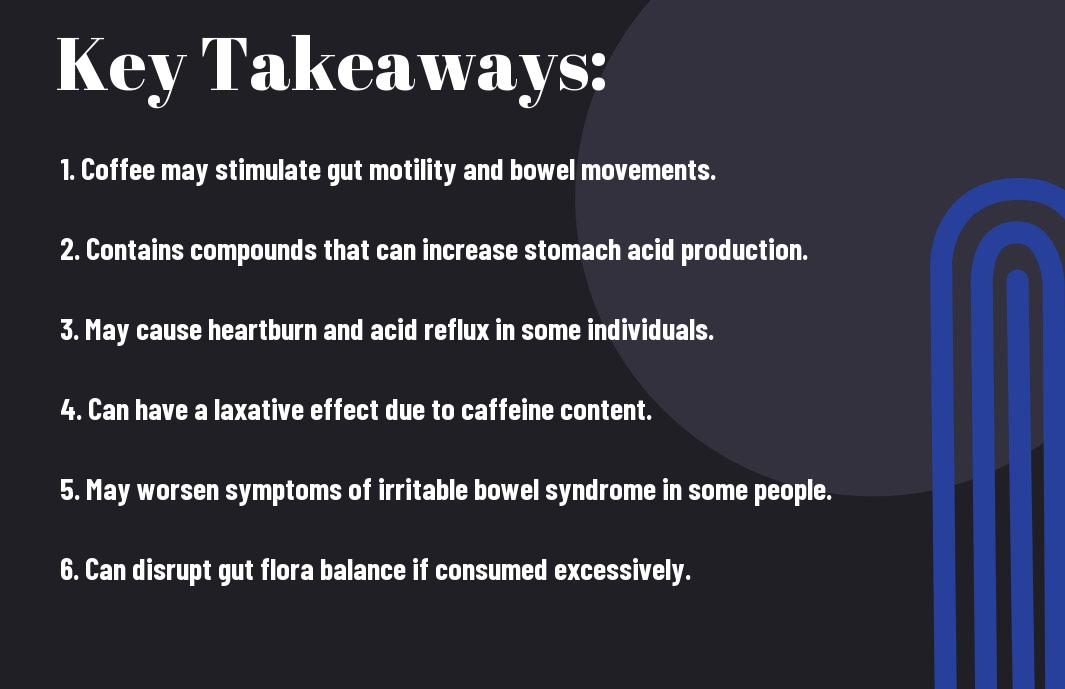Most of us start our day with a hot cup of coffee, but have you ever wondered how this popular beverage impacts our digestion? In this insightful article, we will explore into the effects of coffee on our digestive system, exploring both its benefits and potential drawbacks. By the end, you’ll have a newfound appreciation for that morning pick-me-up and a better understanding of how it interacts with your body.

Key Takeaways:
- Caffeine and Acidity: Coffee stimulates the production of stomach acid, which can lead to indigestion and acid reflux for some individuals.
- Speeds up Digestion: Coffee can speed up the digestive process, which may result in quicker bowel movements for some people.
- Changes in Gut Bacteria: Coffee can impact the balance of gut bacteria, potentially leading to changes in digestion and bowel movements.
- Hydration Levels: Coffee can act as a diuretic, leading to increased urination and potentially affecting overall hydration levels, which are important for digestion.
- Individual Variations: The effects of coffee on digestion can vary from person to person, depending on factors like tolerance to caffeine, overall diet, and any existing digestive issues.
The Basics of Digestion
How the digestive system works
For proper digestion to occur, the body relies on a complex system that involves various organs working together. The process starts in the mouth, where enzymes in saliva begin breaking down food. From there, the food travels to the stomach, where stomach acids and enzymes continue the digestion process. The nutrients from the digested food are then absorbed in the small intestine, with the help of bile from the liver and enzymes from the pancreas. Finally, any remaining waste is passed to the large intestine for elimination.
Importance of digestion for overall health
On a fundamental level, digestion is vital for the body to break down food into nutrients it needs to function properly. Without proper digestion, the body cannot absorb vital vitamins, minerals, and other nutrients necessary for overall health. Poor digestion can lead to various issues such as nutrient deficiencies, digestive discomfort, and even more serious health conditions if left untreated.
Understanding the importance of digestion for overall health is crucial in maintaining a healthy lifestyle. A well-functioning digestive system not only ensures that the body receives the necessary nutrients but also plays a role in supporting a strong immune system and proper hormonal balance. By focusing on good digestion, individuals can improve their overall well-being and prevent potential health issues in the long run.

Coffee’s Impact on Digestion
Caffeine’s effects on the gut
Assuming you’re a coffee lover, you’re probably familiar with the boost of energy and alertness that comes with your morning cup of joe. Any avid coffee drinker can attest to the speedy trip to the bathroom that often follows. Caffeine, a key component in coffee, is a stimulant that can cause your gut to contract, leading to bowel movements and potentially aiding in digestion.
How coffee can speed up digestion
Impact on digestion can also be attributed to other compounds in coffee besides caffeine. Coffee consumption triggers the release of gastrin, a hormone that speeds up the movement of food through the digestive tract. This accelerated transit time can result in more frequent bowel movements and may explain why coffee is often associated with improved digestion.
Caffeine’s role in speeding up digestion is well-documented, but it’s important to note that individual reactions can vary. Some people may find that coffee has a laxative effect on them, while others might not experience the same results. It’s necessary to pay attention to how your body responds to coffee and adjust your intake accordingly for optimal digestive health.
The role of acidity in coffee’s digestive effects
Digestion can also be influenced by the acidity of coffee. The high acidity levels in coffee can stimulate the production of gastric acid in the stomach, which aids in breaking down food. This increased acid production can potentially enhance digestion by ensuring that nutrients are properly absorbed.
Another factor to consider is that while acidity can be beneficial for digestion, it may also pose a challenge for individuals with acid reflux or stomach ulcers. In such cases, opting for lower-acid coffee varieties or consuming coffee with food can help minimize any negative effects on digestion.
The Gut-Brain Connection
How the gut and brain communicate
To understand the relationship between the gut and the brain, we must examine into the intricate network known as the gut-brain axis. This connection involves bidirectional communication between the central nervous system (CNS) and the enteric nervous system (ENS) of the gut. The ENS, often referred to as the “second brain,” plays a significant role in regulating gastrointestinal functions independently of the CNS. Signals travel along the vagus nerve, linking the gut and brain and influencing various physiological processes, including digestion.
Coffee’s influence on the gut-brain axis
An intriguing aspect of coffee consumption is its impact on the gut-brain axis. Coffee contains compounds that can modulate neurotransmitters such as dopamine and serotonin, which play crucial roles in mood regulation and cognitive function. Additionally, caffeine, a well-known stimulant in coffee, can affect alertness and focus by interacting with adenosine receptors in the brain. These mechanisms highlight how coffee consumption can influence not only gut health but also cognitive processes and emotional well-being.
Plus, research suggests that the polyphenols present in coffee may have protective effects on brain health, potentially reducing the risk of neurodegenerative diseases. These compounds exhibit antioxidant and anti-inflammatory properties that could help safeguard neurons from damage and promote overall brain health.
The impact of gut health on overall well-being
To underscore the importance of gut health, it is crucial to recognize its profound impact on overall well-being. The gut houses trillions of microorganisms collectively known as the gut microbiota, which play a pivotal role in digestion, nutrient absorption, and immune function. Disruptions in the gut microbiota, known as dysbiosis, have been linked to various health conditions, including inflammatory bowel diseases, obesity, and mental health disorders.
Connection: Therefore, maintaining a healthy gut environment through proper diet, lifestyle choices, and potentially incorporating beneficial substances like coffee, can significantly influence not only digestive health but also mental and emotional well-being. By nurturing the gut-brain connection, we can optimize our overall health and vitality.

Coffee’s Effects on Gut Bacteria
The importance of gut bacteria for digestion
The gut microbiome, made up of trillions of bacteria, fungi, and other microbes in our digestive tract, plays a crucial role in our overall health and digestion. These microorganisms help break down food, produce crucial nutrients, and support the immune system.
How coffee can alter the gut microbiome
Research suggests that coffee can impact the diversity and composition of gut bacteria. The caffeine and other compounds in coffee can act as prebiotics, promoting the growth of beneficial bacteria. However, excessive coffee consumption may also lead to the overgrowth of harmful bacteria.
For instance, a study published in the Journal of Internal Medicine found that high coffee intake was associated with a decrease in anti-inflammatory bacteria in the gut. This imbalance in the gut microbiome could potentially lead to digestive issues and inflammation.
The consequences of an imbalanced gut microbiome
Coffee’s effects on gut bacteria can have significant consequences on digestion and overall health. An imbalanced gut microbiome has been linked to a variety of health conditions, including irritable bowel syndrome (IBS), allergies, obesity, and autoimmune diseases.
Microbiome research is still evolving, but it’s clear that maintaining a diverse and healthy gut microbiome is crucial for optimal digestion and overall well-being. Moderation in coffee consumption, along with a diet rich in fiber and fermented foods, can help support a healthy gut microbiome.

Coffee and Digestive Issues
Coffee’s role in exacerbating digestive problems
All coffee lovers know that the beverage can have both positive and negative effects on our bodies. Pertaining to digestion, coffee can sometimes exacerbate existing issues. For individuals with sensitive stomachs or digestive disorders, coffee’s acidity and stimulating effects can lead to discomfort and irritation. If you already struggle with digestive problems, it might be worth considering reducing your coffee intake or opting for lower-acid options to see if it makes a difference.
How coffee can trigger acid reflux and heartburn
Digestive issues such as acid reflux and heartburn are common complaints among coffee drinkers. Coffee can relax the lower esophageal sphincter, the muscle responsible for preventing stomach contents from flowing back into the esophagus. When this muscle relaxes, stomach acid can creep up, causing that uncomfortable burning sensation in your chest. If you suffer from acid reflux or heartburn, paying attention to how coffee affects you and potentially switching to a milder brew or smaller servings might help alleviate symptoms.
For individuals prone to acid reflux and heartburn, it is recommended to avoid drinking coffee on an empty stomach or close to bedtime. These precautions can help reduce the likelihood of experiencing discomfort associated with these digestive issues.
The link between coffee and irritable bowel syndrome (IBS)
An association has been found between coffee consumption and irritable bowel syndrome (IBS), a common gastrointestinal disorder characterized by symptoms like abdominal pain, bloating, and changes in bowel habits. While coffee affects everyone differently, some individuals with IBS may find that coffee exacerbates their symptoms.
Excessive caffeine intake can stimulate the digestive tract, causing contractions that may trigger or worsen IBS symptoms. If you have been diagnosed with IBS or suspect you may have it, monitoring your coffee intake and its effects on your digestive system can be a helpful step in managing your symptoms.
Individual Variations in Coffee Sensitivity
Why some people are more sensitive to coffee’s effects
Despite coffee being a popular morning staple for many, some individuals experience more pronounced effects on their digestion after consuming it. This sensitivity to coffee can vary from person to person and is influenced by several factors.
Genetic factors influencing coffee sensitivity
Some people are genetically predisposed to be more sensitive to the effects of coffee on digestion. Certain genetic variations can impact how the body metabolizes caffeine, leading to differences in how individuals react to their morning brew.
- Genetic factors play a crucial role in determining how sensitive someone is to coffee.
Any individual’s genetic makeup can influence how their body processes and reacts to caffeine, ultimately affecting their digestive system’s response to coffee consumption.
- Genetic variations can impact how efficiently caffeine is metabolized in the body.
Lifestyle factors affecting coffee’s impact on digestion
Coffee’s impact on digestion can also be influenced by lifestyle factors such as diet, stress levels, and overall health. These variables can interact with coffee consumption to either exacerbate or mitigate its effects on the digestive system.
- Assume that dietary habits and stress levels can enhance or reduce the impact of coffee on digestion.
Coffee consumption, when combined with a high-stress lifestyle or certain dietary choices, can lead to more pronounced digestive issues in some individuals. Conversely, a healthy diet and stress-management techniques can help lessen these effects.
- Assume that lifestyle factors can either amplify or diminish the effects of coffee on digestion.
Variations in how individuals experience the effects of coffee on digestion can be attributed to a combination of genetic predispositions and lifestyle factors. Understanding these individual differences can help tailor coffee consumption habits to promote better digestive health.
Summing up
Upon reflecting on the effects of coffee on digestion, it is clear that while coffee can have both positive and negative impacts on our digestive system, it ultimately depends on individual tolerance levels and consumption habits. As explored in the article “How does coffee affect digestion”, the caffeine in coffee can stimulate acid production in the stomach, which may lead to gastrointestinal issues for some individuals. However, coffee also has the potential to promote regular bowel movements and improve overall digestive function for others.
For a more in-depth look at the relationship between coffee and digestion, I recommend checking out the informative blog post “Coffee & Your Digestion” by Manhattan Gastroenterology here. By being mindful of your own body’s response to coffee and listening to its signals, you can determine how best to incorporate this beloved beverage into your daily routine while maintaining a healthy digestive system.
FAQ
Q: How does coffee affect digestion?
A: Coffee affects digestion in multiple ways. The caffeine in coffee stimulates the central nervous system, which can increase the production of stomach acid, potentially leading to indigestion and heartburn in some individuals.
Q: Does coffee have any positive effects on digestion?
A: Despite its potential negative impacts, coffee can also stimulate bowel movements due to its laxative effect. This can be beneficial for those struggling with constipation, as it can help promote regularity in bowel movements.
Q: Should I avoid drinking coffee if I have digestive issues?
A: If you have existing digestive issues such as acid reflux or irritable bowel syndrome (IBS), it may be beneficial to limit or avoid coffee consumption, as it can exacerbate these conditions. However, if you do not experience any negative side effects, moderate coffee consumption should not pose a significant risk to your digestive health.
How much caffeine is in a cup of coffee
The Ultimate Guide to Brewing the Perfect Cup of Black Coffee at Home
Caffeine Chronicles – Understanding the Power and Appeal of Black Coffee





